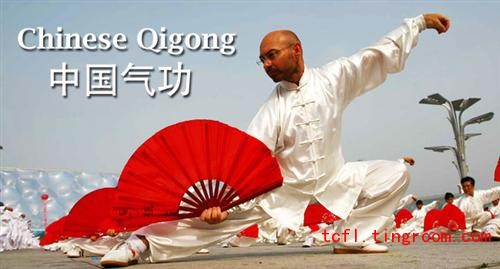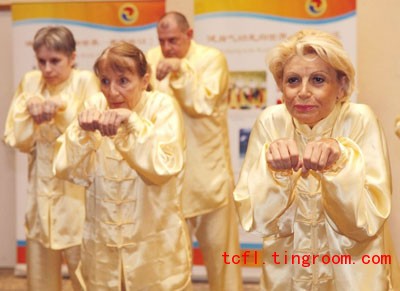Hype or Hope?
Is qigong a miracle medicine? The meditational equivalent of acupuncture? Is it just another New-Age rage that puts the practitioner in a mellow state, making qigong a sort of over-hyped, oriental stress management tool that may involve more self-delusion than hard science? Or is qigong in reality a powerful, mind-over-matter tool that not only can heal its practitioners and strengthen their immune systems, but, in the hands of a master, can also heal others? The skeptical Westerner is tempted to write off qigong as more hype than hope, but then that same skeptical type also wrote off acupuncture when it made its debut in the West. One thing is obvious: qigong generally has an undeniably beneficial effect on its practictioners, and for that reason alone it is being embraced by the government of China as a supplementary health-care tool to relieve suffering and ward off illness.
What is Qigong (Chi Kung)?
On a very elemental level, qigong is a form of meditation. The most disciplined masters of qigong stress its meditational aspect more than the exercise and breathing components that are usually associated with it. As a form of meditation, qigong is focused on harnessing the primordial force of qi (chi), which, it is claimed, every normally-functioning human being is capable of communicating with. "Qigong" is composed of two characters: "qi" (sometimes written as "chi" as an aid to pronunciation, but think instead of "chee" as in "cheese") and "gong" (sometimes written as "kung" as an aid to pronunciation, but "gung" so it rhymes with "jung" – as in Carl Jung the psychiatrist and contemporary of Sigmund Freud – i.e., with more of a "g" sound than a "k" sound, is probably easier for Westerners to get their sound pipes around). "Qi" means air, or breath, but it is more like the breath that God "breathed" into Adam than the air one draws in and exhales, i.e., a life-giving force, or "energy". "Gong" means effort applied in a disciplined manner, or "work", so "qigong" means "energy work".
As it is practiced by the large majority of people today, including over 80 million in China alone, qigong is a system of meditation that combines breathing exercises with Yoga-like movement. It is usually performed in large groups as a way to limber up the body at various times of the day, especially in the morning. The purpose of the combined meditation/ breathing/ movement is to harness the force of qi, directing it through one's body in order to restore the healthy functioning of the organs as well as muscle, bone, and other tissue, thus relieving aches and pains and eliminating stress.
What is the Origin of Qigong?
Qigong is said to be a 5000-year-old practice, but no one really knows how long qigong has been around. We do know that it was practiced by Taoist monks in the third or fourth century BCE, and later also by Chinese Buddhist monks in the first century BCE, both of which groups also used it in martial arts.
We also know that from its earliest orgins in ancient China, qigong was taught under the close tutelage of a master, in the style of the Confucians (sixth century BCE). Part and parcel of this tutelage was an appreciation of the dedication necessary to practice qigong responsibly. In this respect, qigong approaches a philosophy, if not a religion, though today most practitioners of qigong are content to enjoy its salutary benefit, and perhaps its social dimension.
The Spread of Qigong
Today there are qigong institutes and qigong associations all over the world that offer courses, workshops and seminars in the art and practice of qigong. Qigong has become a mainstream lifestyle pursuit on par with Yoga, Tai Chi and aerobics, mainly because it has broken out of the Confucian mold of the close master-apprentice tutelage relationship and has become a mass movement that can be enjoyed privately or in groups of unlimited size – and at little or no cost, though a teacher who has learned the art of qigong is of course still indispensable. For those wishing to get in touch with their "qi" through the guidance of a Chinese master, charter tours to China aimed expressly at learning qigong are becoming increasingly popular.
The Esoteric Side of Qigong
No introduction to qigong would be complete without mentioning its dark side. There are followers of qigong who seem to possess paranormal abilities and/ or psychic powers that are apparently related to qigong meditation. These include teenagers in search of demonic powers as well as more serious adherents who emphasize the meditational aspect of qigong and its original master-apprentice tutelage as a means to attain knowledge and power. Some of the former end with psychiatric problems while many of the latter are said to possess the ability to move objects or to emit electrical charges from their bodies that can be felt by others. Still others in this latter group seem to be able to heal the sick in a quasi-religious placing-of-the-hands ceremony in which qi is claimed to be emitted through the affected person's body. Even the U.S. military has begun to experiment with the bioenergies of qigong in an attempt to bring relief to soldiers suffering from post traumatic stress syndrome (PTSD).
As a primordial force that can be mastered by the astute student who follows the directed teachings of a true master, qigong can also be compared to the supernatural power that supposedly resides in us all, and which formed the basis of the famous Carlos Casteneda novels (eg., The Teachings of Don Juan) that purport to describe a system, or methodology, of shamanism. That force was, like qi, concentrated in the abdomen. Perhaps one should remember that the original inhabitants of the Americas, the Indians, are believed by anthropologists to have arrived in the New World from northern China (modern-day Mongolia) via the Aleutian Islands. Did they perhaps bring with them a knowledge of qi that some tribes managed to preserve and pass on from generation to generation? It's an interesting thought, notwithstanding the controversy surrounding the genuineness of the shamanism presented in the Casteneda novels.
 English
English Japanese
Japanese Korean
Korean French
French German
German Spanish
Spanish Italian
Italian Arab
Arab Portuguese
Portuguese Vietnamese
Vietnamese Russian
Russian Finnish
Finnish Thai
Thai dk
dk